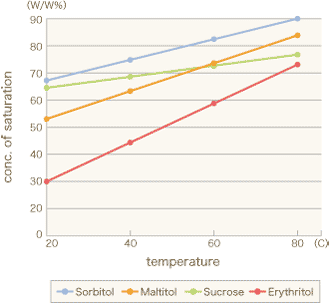What is ERYTHRITOL?
1,General properties of ERYTHRITOL
- 1)4-carbon sugar alcohol
- 2)Naturally occurring substance
- 3)Made from glucose by fermentation
ERYTHRITOL in various foods
| Food | ERYTHRITOL (mg/l,mg/kg) |
|---|---|
| White wine | 170 |
| Red wine | 280 |
| Japanese Sake | 180 |
| Melon | 4.7 |
| Grape (Muscat) | 4.2 |
| Soy Sauce | 910 |
| Miso Bean Paste | 1310 |

2, ERYTHRITOL, its attractive property
- Very low calorie value, compared to other polyols, sugars and bulking agent
- Tooth friendly
Not Metabolized by Oral Bacteria, ideal for use in "Sugar free" products - High Laxative Tolerance, compared to standard polyols
- Attractive taste
Enhances Sweetening Quality of high intensity sweeteners
Synergistic with a wide variety of other polyols and sugars - Strong cooling effect
- Low water activity and Low moisture sensitivity
3,ERYTHRITOL, Physical and Chemical Properties
| 1) Monosaccharide polyol | |
| 2) molecular weight | : 122 |
| 3) Energy | : 0 kcal/g in Japan |
| 4) Sweetness @ 10% soln. | : 70% sugar equivalent |
| 5) Melting point | : 122C |
| 6) Enthalpy | : -42.9 calories/gram |
| 7) Solubility @ 25C in water | : 47grams/100grams |
 Fig.1 moisture sensitivity
Fig.1 moisture sensitivity
 Fig.2 water solubility
Fig.2 water solubility
4,Physical Characteristics of each Polyols
| Number | Caloric | Caloric | Sweetness | Melting | |||
|---|---|---|---|---|---|---|---|
| Mono/Di | of | Molecular | Value JPN | Value U.S. | Level | Point | |
| Saccharide | Carbon | Weight | (Kcal/g) | (Kcal/g) | (%Sucrose) | (C) | |
| ERYTHRITOL | Mono | 4 | 122 | 0 | 0.2 | 70% | 122 |
| Xylitol | Mono | 5 | 152 | 3 | 2.4 | 100% | 94 |
| Mannitol | Mono | 6 | 182 | 2 | 1.6 | 50% | 165 |
| Sorbitol | Mono | 6 | 182 | 2 | 2.6 | 60% | 101 |
| Maltitol | Di | 12 | 344 | 2 | 3.0 | 90% | 150 |
| Isomalt | Di | 12 | 344 | 2 | 2.0 | 40% | 145 |
| Lactitol | Di | 12 | 344 | 2 | 2.0 | 40% | 122 |
| Sucrose | Di | 12 | 342 | 4 | 4.0 | 100% | 193 |
| Heat of | Solubility | |
|---|---|---|
| Solution | (25C) | |
| (J/g) | (g/100gH2O) | |
| ERYTHRITOL | -180 | 47 |
| Xylitol | -153 | 200 |
| Mannitol | -121 | 22 |
| Sorbitol | -111 | 235 |
| Maltitol | -78 | 175 |
| Isomalt | -39 | 39 |
| Lactitol | -53 | 140 |
| Sucrose | -23 | 185 |
5,Maximum NOEL of Polyols in laxative
| NOEL | |||
|---|---|---|---|
| male(g/kg body Weight) | female(g/kg body Weight) | References | |
| Polyol: | |||
| ERYTHRITOL | 0.66 | 0.80 | Oku et al. |
| Xylitol | 0.3 - |
0.3 0.7 |
Koizumi et al. Oku et al. |
| Sorbitol | 0.15 | 0.3 | Koizumi et al. |
| Maltitol | 0.3 | 0.3 | Oku et al. |
| Lactitol | 0.075 | 0.15 | Koizumi et al. |
| Palatinit | 0.3 | - | Internal data |
Reference: Syokuhin to Kaihatsu Vol.33 No.11 1998
